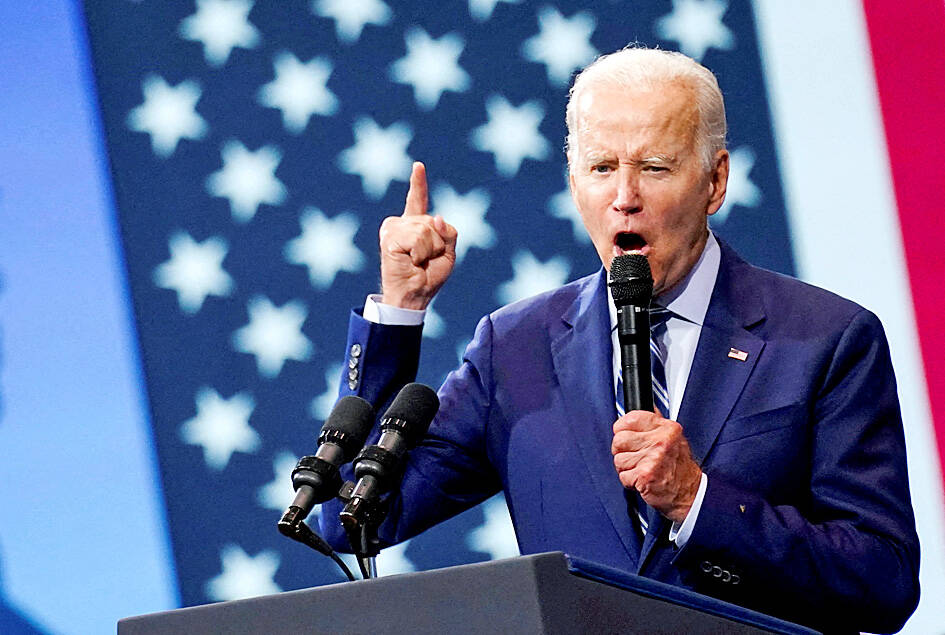The administration of US President Joe Biden is considering moves that would restrict US investment in Chinese technology companies amid growing tensions between the two countries, people familiar with the matter said on Friday.
The investment curbs taking shape would likely come as an executive order to be signed by Biden in the coming months, one of the people said.
A separate action against TikTok, a hugely popular video-sharing app owned by China’s ByteDance Ltd (字節跳動), is possible, but no action is imminent, the person added.

Photo: Reuters
The US Department of Commerce might place further restrictions on chips used for artificial intelligence computing, they said..
The White House is in discussions with the US Congress on legislation requiring companies to disclose planned investments in certain Chinese industries, the other person said.
Among options being discussed is the establishment of a system that would give the US government the authority to block investments outright, the second person said.
The executive order would be part of a broader strategy, they said, adding that the US recently curbed sales of semiconductors to China and Russia.
Last month, Biden signed into law a broad competition measure that includes about US$52 billion to bolster domestic semiconductor research and development.
The White House declined to comment on Friday.
TikTok representatives did not immediately respond to a request for comment.
The commerce department expects to by the end of the year have an update on steps to protect Americans’ data from foreign-owned apps, the department’s press office said earlier this week.
US companies are under increasing government scrutiny over what they sell to China, whose electronics factories and consumers make it the biggest buyer of chips.
Washington has been tightening restrictions on sales to the country, arguing that it represents a security risk.
Nvidia Corp shares tumbled on Thursday after the chipmaker said new rules on the export of some artificial intelligence chips could affect hundreds of millions of dollars in revenue.
The executive order might be intended to address some of the concerns contemplated in the draft “national critical capabilities defense act” introduced by US senators John Cornyn and Bob Casey, Biden administration sources said on condition of anonymity.
The US has up to now pursued a patchwork policy that has stopped short of flat-out locking Chinese firms out of the chip industry.
It has concentrated on singling out individual companies, such as Huawei Technologies Co (華為) and Semiconductor Manufacturing International Corp (中芯), that it has accused of being a threat to national security.
Both companies deny the allegations.
Recent steps indicate that the administration is leaning toward a more hawkish stance of banning Chinese access to whole swaths of technology, experts have said.

The Central Election Commission has amended election and recall regulations to require elected office candidates to provide proof that they have no Chinese citizenship, a Cabinet report said. The commission on Oct. 29 last year revised the Measures for the Permission of Family-based Residence, Long-term Residence and Settlement of People from the Mainland Area in the Taiwan Area (大陸地區人民在台灣地區依親居留長期居留或定居許可辦法), the Executive Yuan said in a report it submitted to the legislature for review. The revision requires Chinese citizens applying for permanent residency to submit notarial documents showing that they have lost their Chinese household record and have renounced — or have never

A magnitude 5.6 earthquake struck off the coast of Yilan County at 12:37pm today, with clear shaking felt across much of northern Taiwan. There were no immediate reports of damage. The epicenter of the quake was 16.9km east-southeast of Yilan County Hall offshore at a depth of 66.8km, Central Weather Administration (CWA) data showed. The maximum intensity registered at a 4 in Yilan County’s Nanao Township (南澳) on Taiwan’s seven-tier scale. Other parts of Yilan, as well as certain areas of Hualien County, Taipei, New Taipei City, Taoyuan, Hsinchu County, Taichung and Miaoli County, recorded intensities of 3. Residents of Yilan County and Taipei received

Taiwan has secured another breakthrough in fruit exports, with jujubes, dragon fruit and lychees approved for shipment to the EU, the Ministry of Agriculture said yesterday. The Animal and Plant Health Inspection Agency on Thursday received formal notification of the approval from the EU, the ministry said, adding that the decision was expected to expand Taiwanese fruit producers’ access to high-end European markets. Taiwan exported 126 tonnes of lychees last year, valued at US$1.48 million, with Japan accounting for 102 tonnes. Other export destinations included New Zealand, Hong Kong, the US and Australia, ministry data showed. Jujube exports totaled 103 tonnes, valued at

BIG SPENDERS: Foreign investors bought the most Taiwan equities since 2005, signaling confidence that an AI boom would continue to benefit chipmakers Taiwan Semiconductor Manufacturing Co’s (TSMC, 台積電) market capitalization swelled to US$2 trillion for the first time following a 4.25 percent rally in its American depositary receipts (ADR) overnight, putting the world’s biggest contract chipmaker sixth on the list of the world’s biggest companies by market capitalization, just behind Amazon.com Inc. The site CompaniesMarketcap.com ranked TSMC ahead of Saudi Aramco and Meta Platforms Inc. The Taiwanese company’s ADRs on Tuesday surged to US$385.75 on the New York Stock Exchange, as strong demand for artificial intelligence (AI) applications led to chip supply constraints and boost revenue growth to record-breaking levels. Each TSMC ADR represents